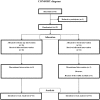Brain training game boosts executive functions, working memory and processing speed in the young adults: a randomized controlled trial
- PMID: 23405164
- PMCID: PMC3566110
- DOI: 10.1371/journal.pone.0055518
Brain training game boosts executive functions, working memory and processing speed in the young adults: a randomized controlled trial
Abstract
Background: Do brain training games work? The beneficial effects of brain training games are expected to transfer to other cognitive functions. Yet in all honesty, beneficial transfer effects of the commercial brain training games in young adults have little scientific basis. Here we investigated the impact of the brain training game (Brain Age) on a wide range of cognitive functions in young adults.
Methods: We conducted a double-blind (de facto masking) randomized controlled trial using a popular brain training game (Brain Age) and a popular puzzle game (Tetris). Thirty-two volunteers were recruited through an advertisement in the local newspaper and randomly assigned to either of two game groups (Brain Age, Tetris). Participants in both the Brain Age and the Tetris groups played their game for about 15 minutes per day, at least 5 days per week, for 4 weeks. Measures of the cognitive functions were conducted before and after training. Measures of the cognitive functions fell into eight categories (fluid intelligence, executive function, working memory, short-term memory, attention, processing speed, visual ability, and reading ability).
Results and discussion: Our results showed that commercial brain training game improves executive functions, working memory, and processing speed in young adults. Moreover, the popular puzzle game can engender improvement attention and visuo-spatial ability compared to playing the brain training game. The present study showed the scientific evidence which the brain training game had the beneficial effects on cognitive functions (executive functions, working memory and processing speed) in the healthy young adults.
Conclusions: Our results do not indicate that everyone should play brain training games. However, the commercial brain training game might be a simple and convenient means to improve some cognitive functions. We believe that our findings are highly relevant to applications in educational and clinical fields.
Trial registration: UMIN Clinical Trial Registry 000005618.
Conflict of interest statement
References
-
- Blakemore SJ, Choudhury S (2006) Development of the adolescent brain: implications for executive function and social cognition. J Child Psychol Psychiatry 47: 296–312. - PubMed
-
- Park DC, Lautenschlager G, Hedden T, Davidson NS, Smith AD, et al. (2002) Models of visuospatial and verbal memory across the adult life span. Psychol Aging 17: 299–320. - PubMed
-
- Luna B, Garver KE, Urban TA, Lazar NA, Sweeney JA (2004) Maturation of cognitive processes from late childhood to adulthood. Child Dev 75: 1357–1372. - PubMed
-
- Schaie KW (1994) The course of adult intellectual development. Am Psychol 49: 304–313. - PubMed
-
- Baltes PB, Lindenberger U (1997) Emergence of a powerful connection between sensory and cognitive functions across the adult life span: a new window to the study of cognitive aging? Psychol Aging 12: 12–21. - PubMed
Publication types
MeSH terms
LinkOut - more resources
Full Text Sources
Other Literature Sources
Medical


